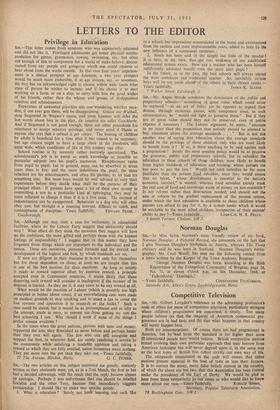Sus,—Although one may state a case for uniformity in educational
facilities, where do the Labour Party suggest that uniformity should stop ? What effect do they think the measures they suggest will have qn the ambitious, the more gifted and perhaps those with the keenest feelings of responsibility ? I suggest that in this matter they have forgotten three things which are important to the individual and the nation. These are incentives, personal freedom apd the pursuit and development of the highest and best, by which standards are set.
If men are diligent in their business it is not only for themselves but for those dependent on them; at least we are taught that this is one of the best motives for their exertions. As long as society is ready to reward superior effort by superior reward, a principle accepted even in Communist countries, it seems likely that those deserving such reward will consider it Inadequate if the manner of its disposal is limited. As they see it, it may cease to be any reward at all.
What would be the reaction of Labour (which is possibly too high principled to bother about votes), if an overwhelming case were made on medical grounds to stop smoking and to exact a tax to cover the lost revenue and apportion it to research or the ballet ? Such a case could. be stated, but it would be as presumptuous and as silly as the attempt, made in envy, to prevent me from getting my son the best schooling I can. Why should I work if none of the things I prefer remain available ?
In the times when the great patrons, persons with taste and money, supported the arts, they flourished as never before and perhaps better than they ever will again. The few who can still recognise and support the best, in whatever field, are surely rendering a service to the community while satisfying a laudable ambition and taking a reward to which they are fully entitled, unless incentives mean nothing. They put more into the pot than they take out.—Yours faithfully,


































 Previous page
Previous page